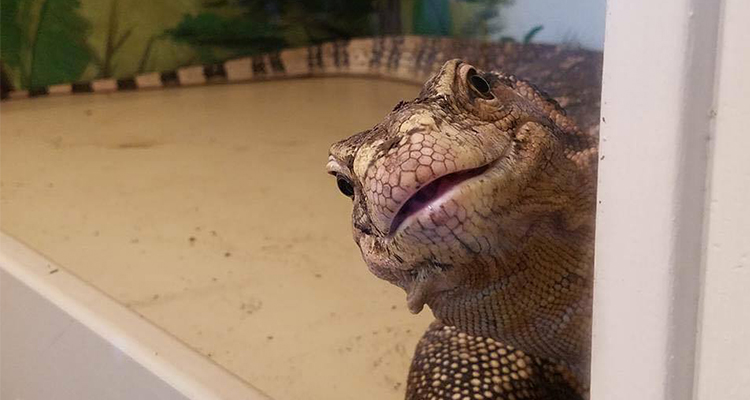I first met Norbert in his classroom. Norbert and I now are friends. He occasionally roams West Liberty University’s Zoo Science classroom with impunity, slowing occasionally when someone gives him a pat on his shoulder or just acknowledges his presence. He is hard to ignore and has become a regular at this academy. Never mind he’s a 6-foot-long Asian monitor lizard with a tongue that seems to be half that long, he’s still my new LFF.
A zoologist is defined as an expert in the behavior, physiology, classification, distribution of animals and the protection of all species threatened with extinction. This is an apt description for the educators in charge of the Zoo Science and Applied Conservation major at West Liberty University.
They are:
- Karen Kettler, Ed. D. Interim Dean of the College of Sciences.
- Zachary Loughman, Ph.D. Coordinator of the Zoo Science and Applied Conservation Major.
- Joe Greathouse, Ph.D. Director of Oglebay Good Zoo.
What I found unique about this is there are only five colleges in the United States to offer this program, but West Lib is the only one that also offers a master’s degree in ZooSci and maintains a diverse array of animals on campus for students to learn animal husbandry with.
Kinsey Skalican-Guthrie, the animal care coordinator, gave me a guided tour of the Zoo Science aspect of the major, which involved portions of two, whole floors. That’s when I met Norbert, the aforementioned monitor — named for a baby dragon belonging to Hagrid of “Harry Potter” fame — who wouldn’t hold still long enough to pet, and various other “tenants.” They included a hellbender salamander, a species of aquatic giant salamander endemic to eastern North America, in conjunction with a crayfish, a multitude of different geckos, a three-toed sloth and a tegu lizard. Several more species will soon be calling West Lib home, including multiple species of birds and other reptile and amphibians.
Along the way, I met Dakota, a student in this major. She told me of her choice for the next two years. “In the third year we can choose to stay with zoo science or the applied conservation program,” she said. “but we have to pick one.”
“What’s the difference?” I asked.
“They both will afford me a good living, but conservation interests me more.”
And she was right. The U.S. Department of Labor reported that the rate of job growth for various positions related to animal care careers will increase at a more rapid (15 percent rate) than other job markets from 2012-22. Examples of potential careers within this line of work include: veterinary assistants and technicians; laboratory animal caretaker; zoo and aquarium animal keepers, curators and research biologists; animal trainers; keepers and managers at sanctuaries, wildlife rehabilitation facilities and nature centers; and managers within the pet care industry.
Opportunities for employment are present with the U.S. Fish and Wildlife Service. On the Association of Zoos & Aquariums website, the job list is 10 mouse scrolls long. They include all the above plus zoo registrars, administrators for nature centers, sanctuaries, rehabilitation centers and fish hatcheries. Even the U.S. Military is getting in the act, hiring graduates to train and properly care for their animals. WLU’s ZooSci major provides students with on-campus opportunities to engage with animals under human care in addition to the hands-on training at the Good Zoo at Oglebay and The Wilds, where students take an onsite class in Zoo Animal medicins 80 miles to the west in Cumberland, Ohio.
There’s no doubt that in the foreseeable future we’ll have young people making gainful employment doing what they love to do, which is a reward in itself. But, all is not — nor does it smell like — roses. One has to be committed to the total care of all animals, and this means cleaning up the feces. “Poop Patrol” is a must for everybody and usually thins the ranks.
I’m a lover of all animals that don’t want to eat me. Always have been, always will be. I found the people I interviewed to be very helpful, kind, engrossed in what they learn and teach, and more than willing to put into practice knowledge, as well as willing to pay back student loans for the privilege of this knowledge. Like many of us, when I heard of this major my first thought was “Zoo what?” The morning I spent at the hilltop visiting Arnett Hall was informative and also enlightening.
It was awesome to see humans who truly cared for the safety and well-being of all God’s creatures, and I left thinking: There’s hope for us yet.
• Tom Rinkes is a retired over-the-road truck driver who caught the writing bug in 2010. He is married to Patricia, and they have two grown children and two grandchildren. He has self-published one novella, HoloBall, and recently had another novella, “Time To Quit,” published by Running Wild Press in their Novella Anthology Vol. 2. He’s also written several articles for Weelunk. When not writing historical fiction, he enjoys woodworking. Tom lives in a small, Eastern Ohio farming community where, whenever any of the neighbor’s pets venture onto the road, they have the right of way.


